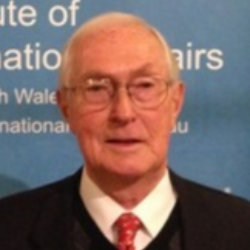Can Trump make the Planet Safe, as well as America Great?
November 9, 2024
Trump’s stated positions on major international issues, e.g. climate change and the value and importance of multilateral institutions, both political and economic, and on particular issues such as Ukraine, the Middle East and relations with China, give grounds for plenty of concern when compared with Australian interests and policies.
Australia is a small country in everything but geography, and dependent—for example in regard to trade—on a working and agreed international system. The US on the other hand is the strongest and richest country in the world, and under Biden, let alone a future Trump, has not been above blocking the WTO’s appeals system from functioning effectively because it was not confident it would get its way. It has reduced the emphasis it has given to other UN bodies for the same reason. Trump’s “MAGA” policies are not much short of an “anti-globalisation” agenda. He doesn’t seem to attach much importance to climate change.
Of course it remains to be seen to what extent his stated policies, for examples tariffs on everything imported into the US, huge tariffs on Chinese goods, are implemented. It has widely been reported that Trump and those around him believe that a mistake of his first Presidency was to appoint to Cabinet and other senior positions people fundamentally out of sympathy with what he was trying to do, and that they (in the person of his son Donald) are determined to appoint “true believers” this time. And they may well, but even so some possible courses of action may lose their appeal when subjected to careful examination. It will certainly be instructive to see who he appoints to major portfolios.
What should Australia do? I think it will be important to establish clearly where our basic positions differ from those of a Trump administration, and be prepared to argue strongly for them, for example in international fora. At the same time we should make our mark with Trump and his new appointees as well as we can, against the day when we might have to defend our interests on a particular issue, as Malcolm Turnbull had to do on refugees and steel tariffs. In regard to that it seems universally conceded that Kevin Rudd has been doing a good job as Ambassador, and also that PM Albanese’s congratulatory phone call with Trump was cordial and went well. That’s all in line with the advice recently given publicly by Joe Hockey, for example: don’t take stated positions too literally, stress our long-standing close relationship, and have confidence in our ability to make our cases if we need to seek specially favourable treatment: “Trump likes Australia”, according to Hockey.
A few words on some particular issues. As a peace-loving country we should be interested in Trump’s stated position that he wants to get the US out of wars, not into them. We may see examples of that being played out in regard to Ukraine—“achieving peace in a day”— possibly the Middle East and even in regard to North Korea, where during the last Trump administration considerable progress was nearly achieved but at the last minute foiled by the malign intervention of Steve Bannon in a Trump-Kim meeting in Hanoi. Of course in the case of Ukraine there are concerns about the extent of Trump’s sympathy with Putin, but at the same time it seems that consensus opinion is that the war is not going well for Ukraine.
On another strategic issue I personally have doubts about the weight that seems to be being placed on AUKUS as a measure of United States reliability as an ally for us. I’m thinking of the recent Congressional report to the effect that the US is far from achieving its stated fleet number of Virginia-class nuclear submarines, and isn’t increasing that number at a rate that would make some surplus to US requirements by the date foreseen in the AUKUS projections. When you consider that, together with the difficulties we are already having in keeping our Collins fleet serviceable, and the inherent improbability of the final phase of the project—the British ship-building industry designing a new nuclear submarine using US technology to be built in Australia to meet strategic needs that have never been explained to the Australian public—what could possibly go wrong?
Finally, climate. As noted above, Trump doesn’t seem to attach much importance to climate change, despite increasing examples of climate change making extreme weather events worse—for example in Spain—and Queensland—just now—and increasingly dire scientific evidence of tipping points being reached and passed. It is said that he plans to take the US out of the Paris agreements to combat climate change and limit the increase in global temperature, and domestically Biden’s major legislation that includes measures to combat change is said to be at risk. This is a very important issue for Australia, thinking not only of what may happen to our own continent but also of what it may mean for all the South Pacific countries. There’s little doubt that climate change is one issue on which we should make a major effort to make an impression on the views of the Trump administration. As well as making America great it should do its part in making the planet safe!

